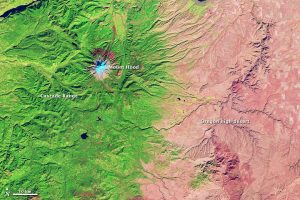About
Ecotone: News & Views on Ecological Science
Ecotone is the news and outreach forum for the Ecological Society of America, featuring breaking news from our scholarly journals and around the ecological community.
Ecotone showcases ecology and ecologists, focusing on ecological science in the news and its use in policy and education. We welcome guest submissions of timely relevant news of importance to the broad ecological community.
eco•tone from ecology (eco; Greek οἶκος, oikos “house/dwelling”) + -tone from the Greek τόνος tonos, “tension.”

Two houses in tension: an ecotone is a border zone, where ecological systems meet and mingle, sometimes forming a new and different community of species. Ecotones occur edges and physical boundaries, where fresh water meets salt water and water meets land, where tides roll up and down coasts, where the fir trees of taiga forests give way to the lichen and grass of tundra and woodlands become pastures.
It refers to the transition from one ecosystem to another, as well the stress inherent in a population at the limit of its tolerance for specific environmental conditions.
The Ecological Society of America
ESA is a professional society for ecologists engaged in all aspects of the discipline, from field work to computational modeling, teaching at all educational levels, environmental policy, communications, and more. The society has convened yearly meetings since its founding, in 1915. We are the largest community of professional ecologists, with 10,000 members worldwide, and a trusted source of ecological knowledge. ESA is committed to advancing the understanding of life on earth.
The society is a 501(c)(3) non-profit organized exclusively for scientific and educational purposes to:
(1) promote ecological science by improving communication among ecologists through publication of journals and holding meetings;
(2) raise the public’s level of awareness of the importance of ecological science and ensure the continuing supply of new ecologists through educational and outreach activities;
(3) increase the resources available for the conduct of ecological science through efforts of the membership in both the private and public sectors; and
(4) ensure the appropriate use of ecological science in environmental decision-making by enhancing communication between the ecological community and policymakers at all levels of government and the private sector; provided, however, that all of the foregoing purposed are within the meaning of Section 501(c)(3) of the internal Revenue Code of 1986, as amended, or the corresponding provision of any future United States Internal Revenue law (the “Code”).
Education
ESA runs workshops for educators, fosters diversity in undergraduate education through our SEEDS program, and maintains a Digital Library of educational resources. Learn more about our educational initiatives on our education page.
Science
Working groups, ad hoc reports and publications, workshops, and small meetings. Learn more about these and other initiatives to advance the science of ecology on the science page.
ESA journals
Our seven journals publish cutting edge research from the full spectrum of ecological science.
- Ecology, ESA’s oldest journal, has reported basic research in ecology since 1920.
- Ecological Applications, as its name implies, focuses on research reports that support environmental decision-making and address emergent problems for environmental policy and management.
- Ecological Monographs publishes longer, data intensive reports representing major empirical and theoretical advances.
- Ecosphere is broad in scope, open access, and designed for rapid publication of research results.
- Frontiers in Ecology in the Environment features short, high impact research reports, reviews, letters, news, commentary, and a commitment to accessible academic prose.
- Bulletin of the Ecological Society of America publishes letters, longer commentaries, and philosophical and methodological items related to the science of ecology. The open access, online archive extends back to the first issue, in 1917.
- Earth Stewardship is ESA’s newest journal. It publishes publishes applied and theoretical articles to promote a broad, intercultural, and participatory foundation for protecting our planet.
Journalists
ESA provides journalists with access to our meetings and publications. We are available to help find experts in ecological science and identify resources. Find more information on our media and communications page or contact Public Affairs Manager Mayda Nathan (mayda@esa.org).